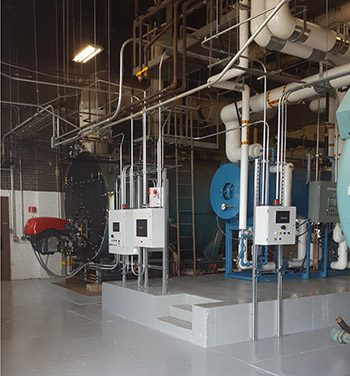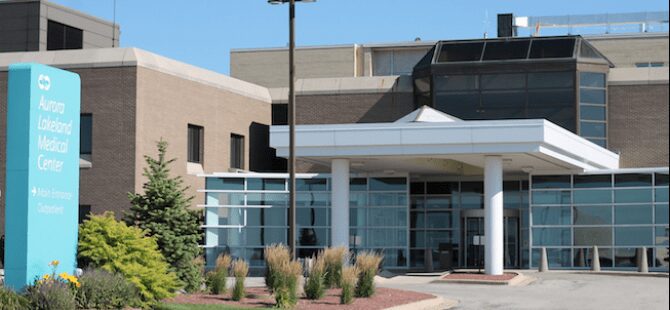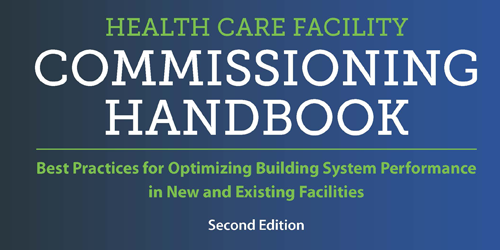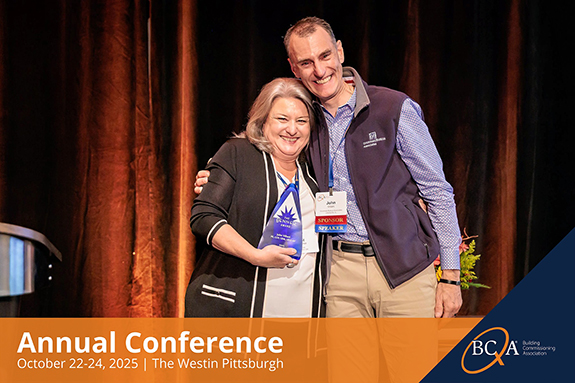Aurora Lakeland Medical Center, Elkhorn, WI, is the site of a GBA boiler plant upgrade recently honored for excellence by ASHRAE Wisconsin.
The steam power plant is remote from the hospital proper and serves steam for humidification, heating, and sterilization. It had four high-pressure steam boilers, two of which had not been in operation for several years. The piping infrastructure associated with these boilers had been disconnected. The two boilers in operation were a 400-HP firetube boiler (B #1) and a 600-BHP firetube boiler (B #3). Currently, the plant distributes high-pressure steam at 80 PSIG in the summer and 90 to 95 PSIG in the winter. B #1 was used as the primary source of steam production.
Daily plant logs included steam pressure and burner firing rates. A review of the boiler firing rates in the provided data indicated that the plant production did not get above 50% capacity (at an outside air temperature of -6°F) of B #1 (assuming firing rate is proportional to output, 6,900 LB/HR); B #1 had a peak rated output of 13,800 LB/HR. Operating staff reported that the boiler typically did not fire at a rate greater than 50%.
The plants’ deaerator had not been in operation for one to two years. It was recently inspected, and the unit did not pass. It was sized for the entire plant capacity; 1,000 BHP. Campus condensate return had been blended with RO make-up in the deaerator vessel. Preheating of the feedwater had been handled by a stack economizer serving B #1 and #3. The economizer provided the system with a degree of improved efficiency, especially considering that the deaerator was inoperable.
The Lakeland facilities team had sent GBA multiple weeks’ worth of plant log information that summed condensate and make-up water over 24-hour periods. In reviewing the condensate and make-up water data, on average (annually), 11% condensate (based on the provided information) had been coming back from the hospital. That implied the plant needed to make-up nearly 90% of its feedwater requirements, which is quite high.

Operation & Maintenance
The overall project had limited maintenance funds, so GBA had to be selective in defining the scope of the plant upgrades. Before design commenced, GBA and AdvocateAurora Health had discovered that the condensate and make-up water metering devices were faulty. New vortex meters were installed to serve each system.
A new Master Plant Control System was provided. Normal operation shall have B #1 operate continuously. Controls implemented allow B #3 to be lead boiler if B #1 fails. Additionally, the design provides for manual selection of the lead boiler through the Master Plant Controller. The burner and deaerator control panels both feed into it for monitoring purposes. Condensate and RO make-up can now be trended for operational purposes.
One of the two inoperable boilers was demolished to allow for the installation of the new deaerator on the boiler room floor (previous deaerator located on a mezzanine) in between B #1 and B #3. The demolished boiler had asbestos-containing materials and was abated at the beginning of the project.
Energy Efficiency
B #1 was the primary steam producer; therefore, focusing on improving its overall operation was critical. A new high-efficiency burner with O2 trim was installed. A turndown greater than 10:1 was achieved with the installed burner. The payback on the burner was estimated to be seven years.
The new jet-spray type deaerator was sized for B #1 capacity of 400 BHP. Dual feedwater and transfer pumps were included. The feedwater pumps were provided with integral VFDs.
Cost Savings and CO2 Reduction
In the end, the overall project budget was $600,000. The project came in under budget, which allowed AAH to demolish the existing deaerator and remove multiple pumps that would no longer be used.
During design, GBA estimated an annual therms savings of approximately 15,400. This equates to a CO2 reduction of 81.5 metric tons.
Wisconsin’s ASHRAE chapter recognized the project with its Technology Award. The project will go on to complete in the ASHRAE Region VI competition. Congratulations to the GBA Wisconsin team, Aurora Lakeland Medical Center, and AdvocateAurora Health for this achievement!



